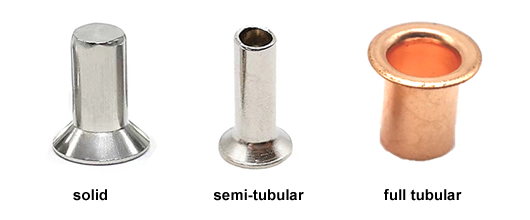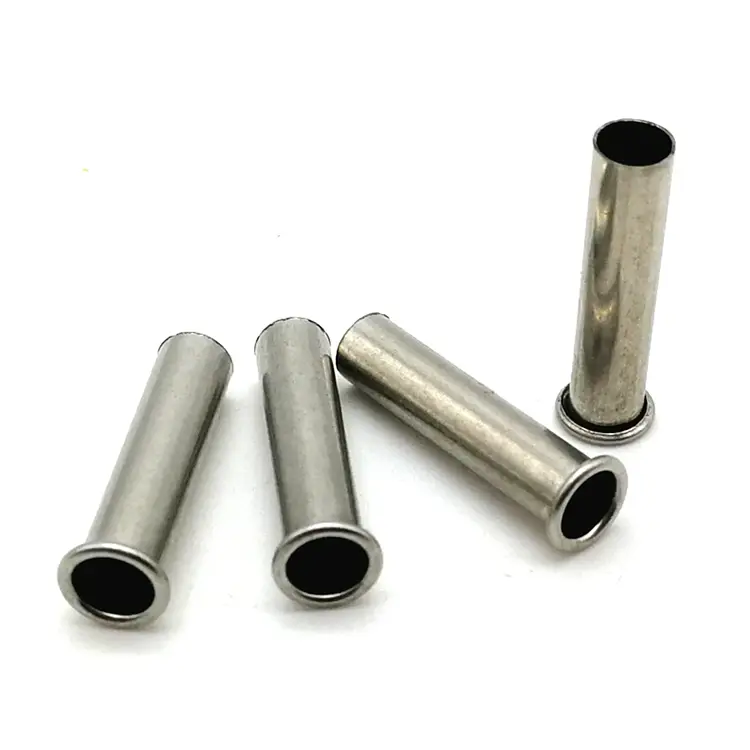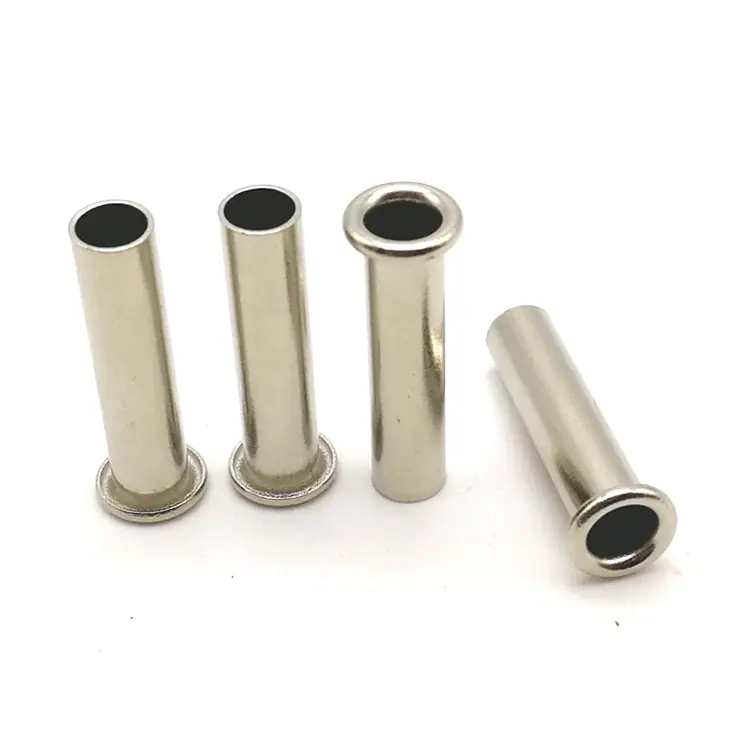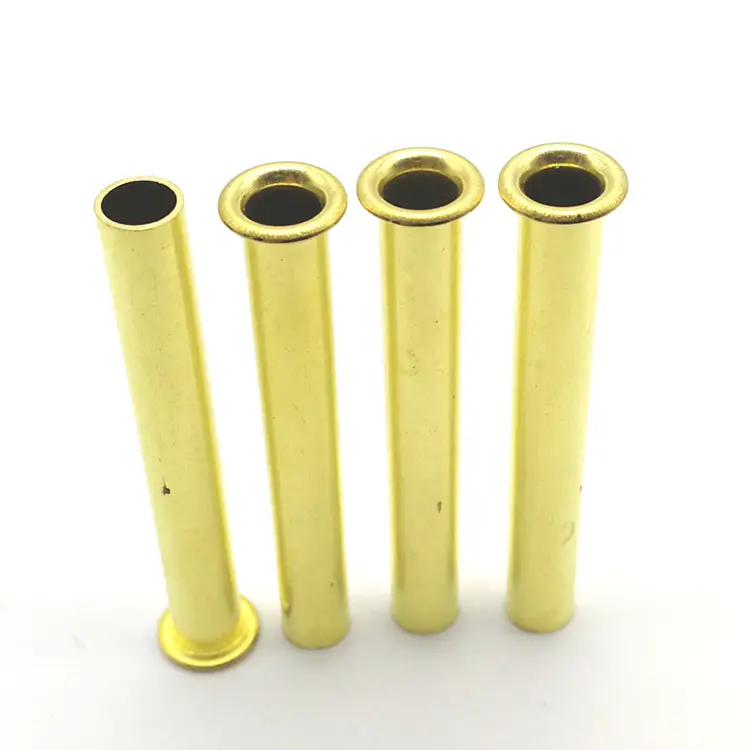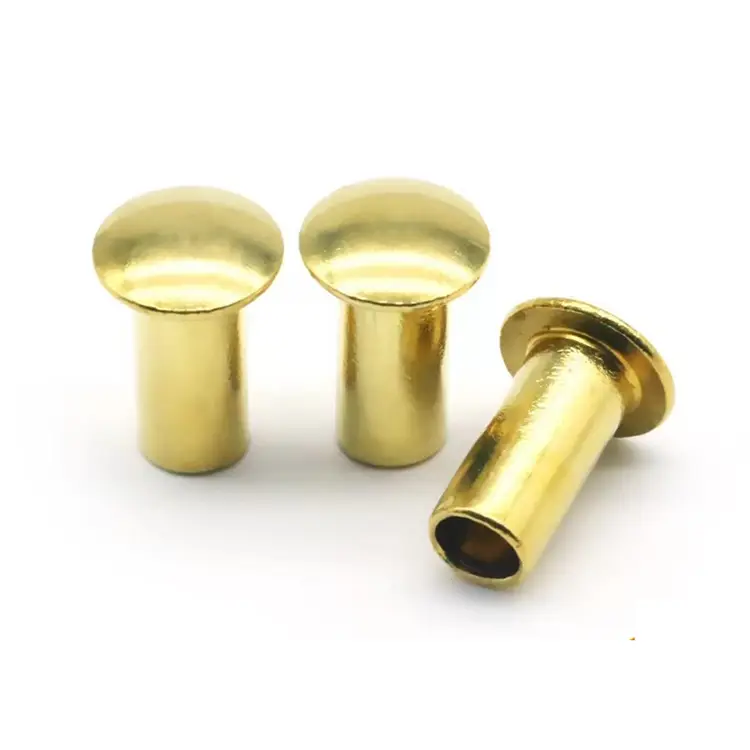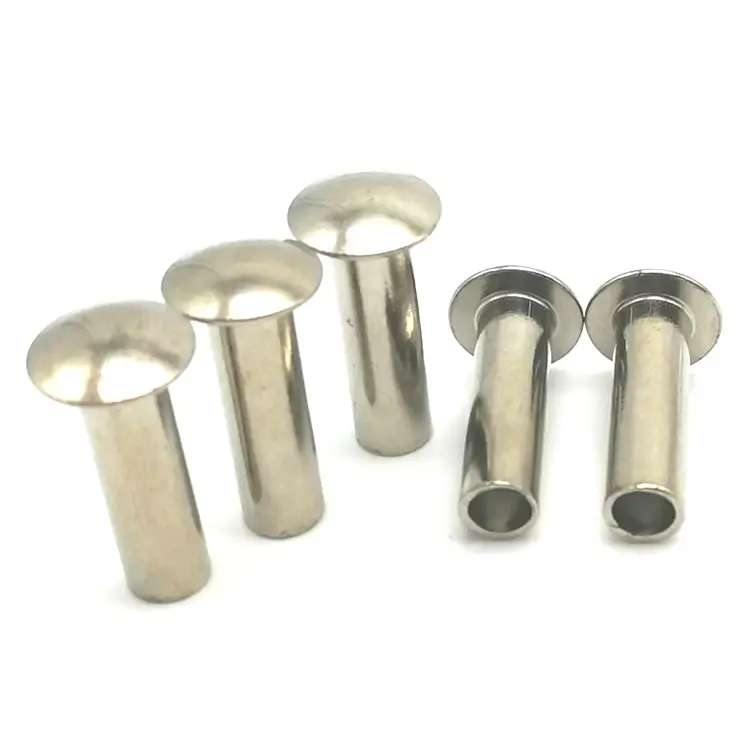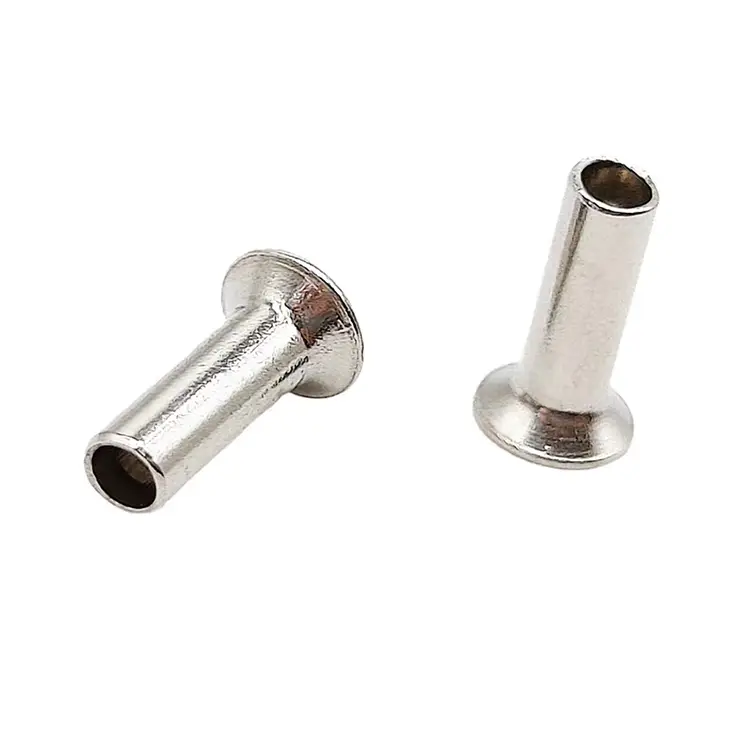Đinh tán
As one of professional manufacturer in China, Notin would like to provide you Rivets. And we will offer you the best after-sale service and timely delivery.
What is a rivet?
A rivet is a permanent mechanical fastener used to join two or more materials. Rivets work by inserting a metal pin into an aligned hole and deforming the end, creating a strong, secure, and durable connection. Unlike temporary fasteners like screws, rivets do not rely on threads, but instead form a permanent connection, making them ideal for applications requiring high strength, durability, and vibration resistance.
Classification of Rivets
Rivets are typically categorized by head shape, degree of hollowness, or material.
Based on head shape, rivets can be classified as flat head rivets, round head rivets, countersunk head rivets, mushroom head rivets, universal head rivets, truss head rivets, etc.

Based on degree of hollowness, rivets can be classified as solid rivets, semi-tubular rivets, or full tubular rivets.
Based on material, rivets can be classified as brass rivets, stainless steel rivets, steel rivets, aluminum rivets, copper rivets, etc.
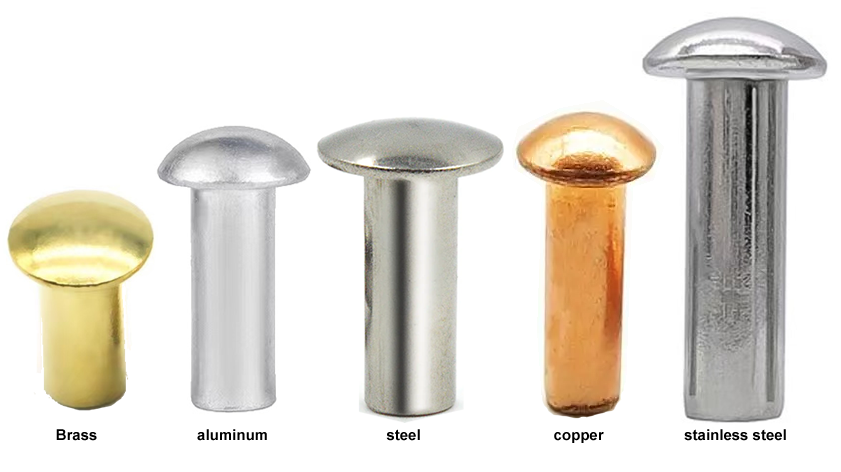
What surface finishes are available for rivets?
Rivet surfaces are typically treated with rust-proofing treatments, primarily electroplating, including zinc plating, nickel plating, chrome plating, tin plating, gold plating, and silver plating. Electroplating is a common rust-proofing method for rivets. It applies a layer of plating to the rivet surface through physical or chemical methods. The plating effectively prevents corrosion and rust, while also providing a certain aesthetic effect.
Another special surface treatment method is head coating. Head coating is performed after the rivet is electroplated. This allows for a variety of colors on the rivet head, achieving an aesthetically pleasing finish.
Aluminum rivets cannot be electroplated, but they can be anodized. Anodizing also allows for a variety of color options, but the unit price is higher than electroplating.
Rust-proofing the rivet surface is crucial, effectively extending the rivet's service life and ensuring a secure connection. Different rust-proofing methods are suitable for different environments and applications, so the choice should be tailored to the specific situation.
- View as
Đinh tán ống bằng thép không gỉ
Đinh tán hình ống bằng thép không gỉ được làm bằng kim loại Nuote, được thiết kế để đảm bảo kết nối bền trong các cụm kim loại, nhựa và hỗn hợp. Kim loại Nuote cung cấp đinh tán rỗng bằng thép không gỉ từ đường kính thân 2.0mm đến 10 mm, chúng có thể có độ dày và chiều dài khác nhau tùy thuộc vào ứng dụng của bạn.
Đọc thêmGửi yêu cầuĐinh tán hình ống thép
Đinh tán hình ống thép, đôi khi được gọi là đinh tán ống thép có thiết kế trục rỗng, giúp giảm lực cần thiết khi lắp đặt trong khi vẫn duy trì độ bền khớp cao. Nuote Metals sản xuất đinh tán dạng ống trong hơn 10 năm, chúng tôi đang bán đinh tán của mình trên 30 quốc gia, hãy liên hệ với chúng tôi để được báo giá hoặc đề xuất buộc chặt của bạn.
Đọc thêmGửi yêu cầuĐinh tán hình ống bằng đồng thau
Nuote Metals là nhà sản xuất đinh tán hình ống bằng đồng ở Trung Quốc trong hơn 10 năm. Một loạt các đinh tán hình ống có sẵn trong kho, các mẫu có thể được cung cấp miễn phí. Chúng tôi cũng chấp nhận đinh tán hình ống tùy chỉnh, gửi cho chúng tôi bản vẽ của bạn để thợ may của bạn.
Đọc thêmGửi yêu cầuĐầu nấm bán đinh tán hình ống
Đinh tán bán hình ống đầu nấm đóng vai trò to lớn khi kết nối các bộ phận như tấm nhựa, tấm kim loại, các bộ phận khung gầm, v.v. Nuote Metals sản xuất đinh tán nửa hình đầu nấm ở Trung Quốc trong hơn 10 năm, đinh tán chúng tôi sản xuất đang được bán sang Mỹ, Canada, Nhật Bản, Indonesia, Malaysia và nhiều nước khác.
Đọc thêmGửi yêu cầuĐinh tán bán hình ống Pan Head
Đinh tán bán hình ống có đầu xoay dễ lắp đặt và mang lại khả năng giữ chắc chắn cho các dự án của bạn. Cho dù bạn đang làm việc trong các dự án xây dựng, ô tô hay sản xuất, đinh tán hình ống nửa đầu hình chảo của chúng tôi là sự lựa chọn đáng tin cậy để đảm bảo công việc được thực hiện tốt. Hãy liên hệ ngay với Nuote Metals cho dự án đinh tán của bạn.
Đọc thêmGửi yêu cầuĐinh tán bán hình ống đầu chìm
Nuote Metals sản xuất và cung cấp nhiều loại đinh tán bán hình ống đầu chìm chất lượng, với hơn 10 năm kinh nghiệm trong ngành, chúng tôi có thể cung cấp cho bạn công cụ và đinh tán phù hợp cho dự án của bạn. Đinh tán hình ống nửa đầu chìm được sử dụng trong các lỗ chìm.
Đọc thêmGửi yêu cầuWhat are the advantages of rivets over other fasteners?
1. Ease of Installation
Rivets are fast to install, and even fully automated for high-volume applications, resulting in a simple and efficient operation process.
2. Connection Reliability
The riveting process is standardized, with strict quality control, resulting in highly stable connections. Visual inspection allows for quick verification of connection quality.
3. Vibration and Impact Resistance
Rivets connect through deformation or interference fit, providing strong clamping force and excellent vibration resistance, capable of withstanding vibration and shock.
4. Low Cost
Rivets are easy to install and can be fully automated, saving significant labor costs.
What are the advantages and disadvantages of rivets made of different materials?
Aluminum Rivets
Advantages: Lightweight, reduces overall product weight, low cost, suitable for general civilian applications.
Disadvantages: Low tensile and shear strength, unsuitable for high-strength workpieces, prone to electrochemical corrosion when in contact with metals such as stainless steel.
Stainless Steel Rivets
Advantages: Strong corrosion resistance, high hardness, suitable for high-strength workpieces (such as marine equipment)
Disadvantages: Higher cost, typically more expensive than aluminum rivets of the same specification.
Brass and Copper Rivets
Advantages: Excellent conductivity (such as connecting electronic components), good corrosion resistance.
Disadvantages: Higher cost, more difficult to process.
Steel Rivets
Advantages: High hardness, high connection reliability, and wide applicability.
Disadvantages: Compared to other materials, iron rivets are more prone to rusting.
What are the main applications of rivets?
Rivets have a wide range of uses, from small items like a pair of scissors to large items like airplanes and ships, as well as in high-precision medical applications.
Industrial Manufacturing
Rivets are used in a wide variety of industrial fields, wherever there is a need to connect two or more materials.
Electronics
Rivets secure heat sinks and chips, providing both vibration damping and noise reduction, and are widely used in the cooling systems of electronic products such as computers and mobile phones.
Automotive
Rivets are widely used to connect components of automobile bodies and chassis, such as doors and hoods. Their lightweight and corrosion-resistant properties make them an indispensable joining method in automotive manufacturing.
Aerospace
In aircraft manufacturing, rivets are used to connect different fuselage components, such as wings and tailplanes. Millions of rivets create high-strength, corrosion-resistant joints. Aluminum and titanium alloy rivets are often used to connect components of corresponding materials, ensuring stability in extreme environments.
Rivets are used everywhere. The above examples only represent a small number of their applications. We see rivets everywhere in our daily lives, such as on scissors, folding beds, and strollers etc. Rivets can be customized to different sizes and materials depending on the application.
Nuote Metals has specialized in the rivet industry for over a decade. Our factory is located in Dongguan, a city known as the "World Factory," a city with a developed industry and convenient transportation. This allows us to respond quickly when acquiring raw materials and supporting surface treatments, meeting our customers' needs for quick access to samples and bulk orders. We produce 10 million rivets daily and have molds of various specifications, allowing us to produce rivets as small as 0.8mm and as large as 10mm. We welcome your inquiries and visits.






